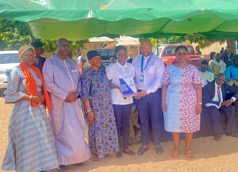
The launch of the advisory note was done during the celebration of World Food Day, organised in Farafenni, North Bank Region by the Food and Agriculture Organization, World Food Programme and other partners.
On behalf of the chairperson of the National Human Rights Commission, Maria Saine said the advisory note provides an overview of the legal framework on the right to food in The Gambia and at the international level.
The note highlights the gaps in the legal framework and proffers recommendations to the government to effectively and adequately guarantee and render justifiable, the right to food and suggested best practices for the attainment of rights to food in the country.
Ms Saine added that the obligation imposed by these rights require a minimum, that the state creates the necessary enabling conditions, including laws, policies and structures for its people to enjoy or have access to necessities such as adequate food and nutrition, clothing, housing, and good health care.
Key in the advisory note is the analysis of how courts can progressively ensure the attainment of the right of food even though it is said to be non-justifiable in the constitution taking into consideration the linkages it has with civil and political rights, Ms Saine further said.
She continued that, as in The Gambia, the constitution does not adequately guarantee economic, social and cultural rights, adding that they are also not enforceable in any court. “What the constitution however presented is an implicit reference to the rights to food under the directive principles of state policy,” she said.
Read Other Articles In National News




